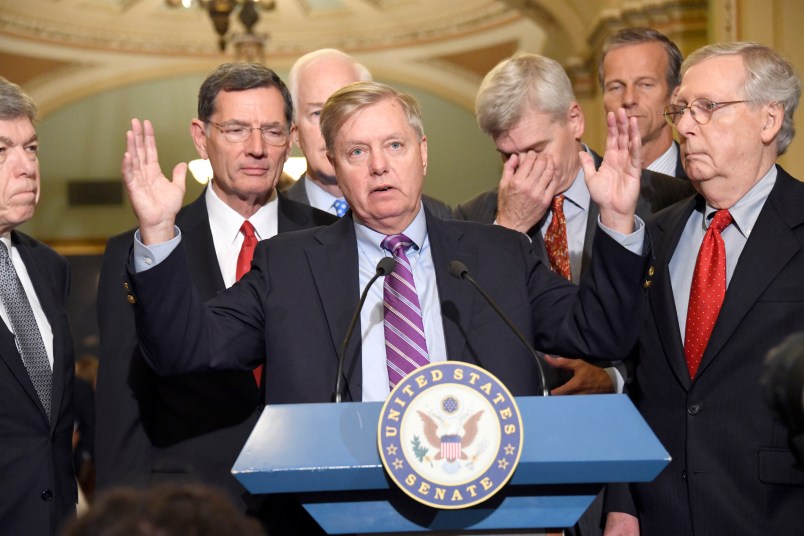After the release of the Mueller Report, we’re now in a welter of bad faith conspiracy theories about Deep State plots against then-candidate and now President Trump. Those smears are being operationalized in the hands of Attorney General Bill Barr who promises a personal investigation into these claims, accusations which have already been the explicit focus of an Inspector General’s report and implicitly the focus of the Special Counsel’s probe itself. There’s also a second Inspector General’s investigation into the same claims from an Inspector General who showed in his last exercise an extreme eagerness to find answers that would please the President. But I want to return to a more basic issue about the beginnings of the Russia probe that gets lost in criticisms both from Trump propagandists but also good faith and not unreasonable criticisms from Trump critics.
To a certain extent I’m talking about the criticism that President Obama didn’t do enough, either behind the scenes or publicly, to counter Russian efforts while they were unfolding. But mainly I’m talking about the decisions career officials made during the 2016 campaign, mostly at a deep operational level Obama probably knew little about. This isn’t some blanket defense. I have lots of criticisms too. My point is a bit different.
Everybody involved on the US side faced a completely unprecedented and almost unthinkable set of facts – an active effort from a hostile foreign power to interfere in a US presidential election and compelling evidence that pointed to the campaign receiving the help being involved. From that starting point, US officials had basically two jobs.
The first was to find out as soon as possible what was happening both for counter-intelligence and law enforcement purposes – to disrupt whatever was happening and, if necessary, hold perpetrators accountable. The second and intrinsically related requirement was to make certain they themselves did not prejudice or damage the integrity of the election – especially not before they were clear on what was happening of whether members of the Trump campaign were complicit in the effort.
This second part of the equation is overwhelmingly important and plays almost no part in the public debate today. It’s important both for understanding the difficult circumstances investigators were working under but also for exploding all the claims that the investigators were somehow trying to set Trump up or use their legitimate law enforcement powers for illegitimate or political ends.
To put the matter simply, investigators needed to find out what was happening and whether there was American complicity without letting the existence of the probe become public and thus unfairly, illegitimately damaging the Trump campaign and the election itself.
There’s always a risk that the existence of an investigation will damage someone who is never charged with a crime. Indeed, this is a relatively common occurrence. But an election campaign is a unique case first because it goes to the heart of the integrity fo the government itself but equally because many more people than those being investigated have something at stake. If an investigation damages a campaign, it’s not just the candidate or her associates who are harmed. It’s everyone in the country who was invested in their victory. Democrats are legitimately still furious that James Comey sent that letter at the end of October 2016 and that Clinton’s campaign was damaged over a comparatively trivial investigation while an investigation of this gravity was kept secret. But still neither is supposed to happen. It goes without saying that news in the fall of 2016 that the FBI was investigating a Trump campaign conspiracy with Russia would have had devastating impact on Trump’s campaign.
Mounting an investigation and maintaining total secrecy about it was a hugely difficult undertaking at which the investigators succeeded. That exasperates Democrats. But it was the investigators’ duty and they fulfilled it. The fact that the key players kept the existence of the probe and the substantial evidence it already had secret really totally explodes any idea that it was a “set up” or “sting” or “political hit” as most Republicans now claim. Clearly the time to use the investigation to political effect was in August or September or October of 2016. The fact that they didn’t speaks for itself. Waiting until after the election to damage Trump politically – if that was the goal – is not only laughable on its face but ignores the obvious point that post-election Trump’s appointees would rapidly take over the national security and law enforcement apparatus.
The biggest reason these conspiracy theories are bogus is just the lack of any evidence to sustain them. But if that’s not enough for some people, the pre-election secrecy really settles the matter. Obvious, yes. But the people with executive power, the ability to launch investigations, are now dedicated to claim the contrary is the truth.






